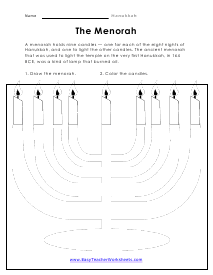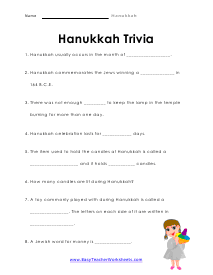These worksheets contain a number of different activities using a dedicated set of vocabulary words related to the Hanukkah celebration, including word search, fill in the blanks, scrambled words, word wall flash cards, acrostic poems, crossword puzzles, and more. The collection also includes six different packs of Bingo cards, which can be used during discussions of the topics. Last but not least, a KWHL (know, what, how, learn) diagram is included to help students pick a topic to explore in more depth. The Hanukkah worksheets found below cover language arts, math, and even a little history. You will find some quick sheets, towards the bottom of the page, that will help you play some Bingo and provide you with writing paper.
Print Hanukkah Worksheets
Click the buttons to print each worksheet and associated answer key.

Story Passage
Hanukkah has been celebrated for over 2000 years. It began in 164 BCE. After winning an important battle, Jews wanted to rededicate their temple in Jerusalem.


The Dreidel Game
A dreidel is like a toy top with four sides. It came from an ancient English top called a teetotem, and dates back to Greek and Roman times.







Alphabetic Order Worksheet
oil menorah gelt latke lights gifts food family star dreidel temple miracle




The Menorah
A menorah holds nine candles - one for each of the eight nights of Hanukkah, and one to light the other candles.


Acrostic Poem
In most cases the word spelled by the first letters is the subject of the poem. Write an acrostic poem about Hanukkah.

Word Search
Includes the vocabulary: Custom, Dreidel, Festival, Gimel, Hallel,Hebrew, Kugel, Latke, Menorah, Sundown, Torah, Tradition




Alphabetic Order
I often see students list "Hebrew" as the first word because it has a Capital letter. I don't get it.











What is Hanukkah?
Do you know what the Hanukkah festival represents and what the story behind it is? Well, it's a very interesting one. Let us get on with it! About more than 2,000 years ago, the Jewish fought against their enemies, who didn't allow them to practice their religious traditions. They even destroyed the Jewish temple in Jerusalem, which had many holy objects, including one sacred lamp, the Menorah. A brave man, Judah, led a small band of people known as Maccabees in a fight against their enemies so that they could freely practice their traditions. However, the enemies were outnumbered, but still, the Jews stood strong and brave, and they achieved victory. When they returned, the first thing that Judah did was restore the sacred lamp. But the sad thing about it was there was very little oil left, enough only for one day. So, he filled the lamp with that oil and lit it. But instead of lasting for just a day, it burned brighter and brighter, lasting for eight days straight! That was a miracle! From that day onwards, every year to honor the victories of the Jews, a day is celebrated, which is known as Hanukkah. The word Hanukkah means rededication, while the celebration itself is called the “Festival of Lights.” The celebrations last for eight days; the first day usually includes a big family dinner with potato latkes, beef briskets, and jelly doughnuts. After dinner, the family gathers around for lighting the Menorah candles, a new candle each day until all eight are lit. Blessings, songs, gifts, and games with toys such as dreidel and chocolate coins, called gelt, are all part of the ceremony.
The History of Hanukkah
Hanukkah (also spelled Chanukah) is an eight-night Jewish festival generally celebrated between late November and December. This year, in 2022, the celebration will begin in the evening on Sunday, December 18, and end on Monday, December 26. Undoubtedly, it is one of the most beloved Jewish holidays, full of light, joy, and family celebration; however, many people are unaware of the rich history and customs of Hanukkah. You’re about to be enlightened.
The Origins of Hanukkah
Hanukkah is celebrated to mark a historical occurrence in Jerusalem during the 2nd century BCE, when the Seleucid Greek state was in control. By building a communion table for Zeus Olympios and offering pig sacrifices, the ruler Antiochus IV Epiphanes desecrated the Jewish Temple in Jerusalem in 168 BCE, outlawing Jewish practice.
A tiny army of Jews, known as the Maccabees, rose in opposition to this religious persecution and won the victory. They reclaimed possession of the Temple, demolished the Zeus-related artifacts, and erected a new altar, allowing them to make sacrifices following Jewish tradition once again. According to a tradition recorded in the Talmud, a collection of Jewish teachings from the third to sixth centuries BCE, a miracle happened around this period.
There was just enough oil to keep the menorah, one of the Temple's most essential ceremonial artifacts, burning for one day, which was a short supply. However, the flame remained lit for eight days until a fresh supply of oil could be procured, laying the groundwork for the eight-night festival of Hanukkah that we know today.
Josephus' Account
According to the most recent available evidence, Flavius Josephus, a first-century Jewish historian, penned his narrative of the holiday's beginnings some 250 years ago. Josephus referred to the occasion as the Festival of Lights rather than Hanukkah. As a consequence of the events, he seemed to be associating the newfound liberty that followed them with the idea of light. Today, the festival is still often known by the name Josephus gave it.
Hanukkah Menorah Lighting
The lighting of a menorah, which represents the miracle of Hanukkah, is the most frequent Hanukkah practice. Many families of the Jewish religion may have these in their homes. In contrast, Jewish organizations and communities may put bigger menorahs on display in public places.
First, a candle is lit initially to burn an added candle for each holiday night. As a result, the preceding candles are lit on the first night, then two more candles are lit on the second night, and so on until the eighth night—placed on the menorah from right to left but lit each night from the left-hand side.
Modern-Day Hanukkah
With the emergence of Zionism, the holiday of Hanukkah took on a whole new significance. Early pioneers in Israel struggled to protect themselves against assaults. They started to feel connected to the ancient Jewish warriors who had held their ground in the same location thousands of years before. In its fair representation of the Jewish warrior, the holiday of Hanukkah appealed to the realities of early Zionists. They felt a special connection to the message of liberation and liberty.
In the years leading up to the establishment of the current State of Israel, the celebration of Hanukkah started to take on new meaning. Hanukkah raises many themes that Jews are painfully aware of in a post-Holocaust world. These include persecution, national identity, religious freedom and expression, and the need to struggle for national independence. As a result, Hanukkah has grown into a celebration rich in historical importance, miraculous stories, physical and supernatural, and ongoing interaction with Jewish yore.
Given that Hanukkah and Christmas both occur around the same time of year, many people question whether Hanukkah is just a Jewish version of the Christmas holiday season. However, it certainly isn't, at least not in a religious sense. Now that you know the rich history of Hanukkah, note that the festival is not just about lighting Menorah. Since it revolves around the miracle of the oil, a typical Hanukkah meal consists mainly of items cooked in olive oil.



